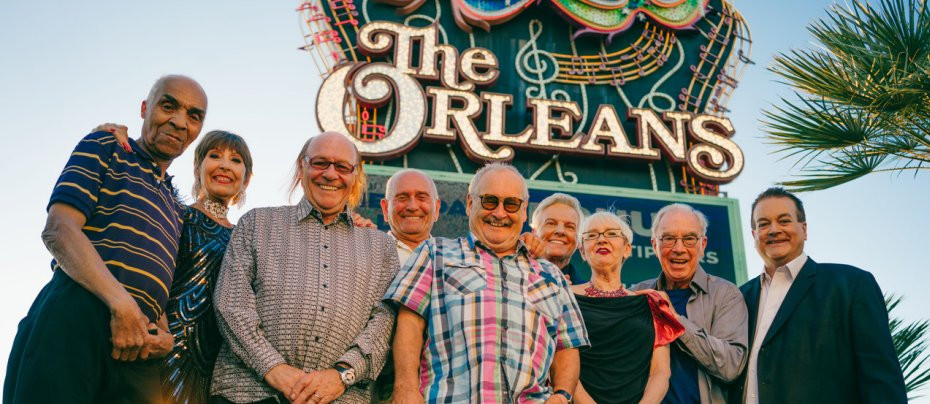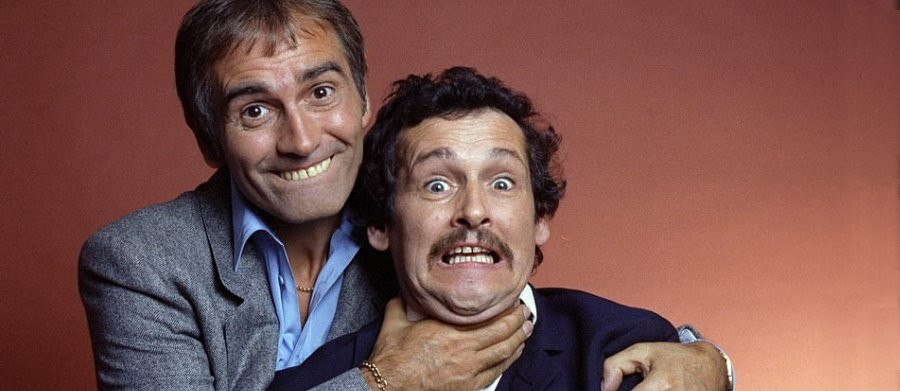
Cannon and Ball
In the 1970s and early 1980s, as BBC1 and ITV fought tooth and nail for viewers, it seemed essential that to gain an advantage in the ratings there had to be a double act leading the way. For Auntie Beeb, Morecambe and Wise set the bar higher than any others would ever attain, and in a different manner altogether, Ronnies Barker and Corbett flew the corporation flag. As if that wasn’t enough talent at the BBC, Little and Large drew in massive audiences on the coveted Saturday evening slot.
For commercial television, the struggle to find new talent was frustrating. Little and Large had been a discovery when winning Opportunity Knocks, but jumped ship to the BBC in 1978 before ITV had barely been able to push them. In a bizarre twist however, it was an Opportunity Knocks flop that would come to their aid when in 1979, Robert Harper and Thomas Derbyshire were unleashed on the Saturday prime time public, where they dominated for nearly a decade in their better known and loved guise as Cannon and Ball.
It’s often felt that the modern celebrity doesn’t earn their stardom through the hard graft of leaner years. If ever a pair earned their shot at the big time, Cannon and Ball did. They weren’t destined for the top from the word go. They met at a welding company in Oldham, and initially the pair had intentions to go into the music business. Bobby was already appearing in working men’s clubs, so he invited Tommy to join him. Bobby sang, with Tommy on drums, but their hopes of hitting it big as a jazz trio with a pianist friend failed as the pianist didn’t like to travel. The early setbacks continued as their big break collapsed when they bombed on Opportunity Knocks in 1969, coming home plum last.
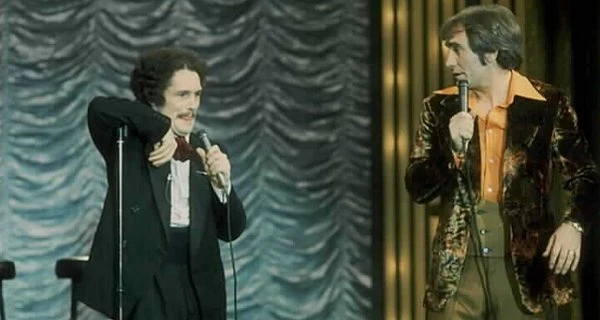
It could have been the end, and for some years they toiled away back at the clubs having moved from music to comedy, with just a recurring guest slot on The Wheeltappers and Shunters Social Club to keep them on television.
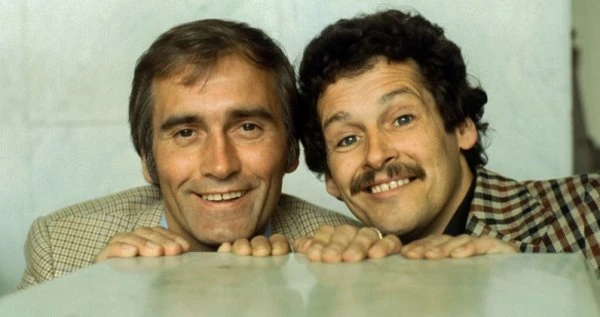
Ironically, it was another failure that would actually prove to be the boys’ big breakthrough moment. In 1978, Bruce Forsyth had been given his own variety show, supposedly a showcase for song, dance and comedy, with big guests alongside its host. Bruce Forsyth’s Big Night bombed, and so in an effort to save it, along with a reaction to a strike at ITV, the elements filmed by resident guests Cannon and Ball were largely binned. The boys’ opportunity had gone again it would seem, were it not for Michael Grade, who had seen enough to believe they could be the answer to ITV’s Saturday night light entertainment tug of war with the BBC. He commissioned The Cannon and Ball Show in 1979 and the rest, as they say, is history.
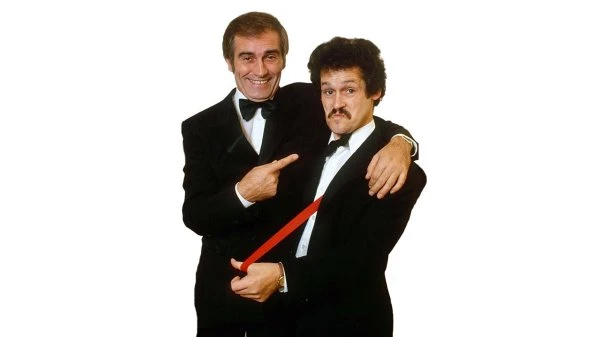
The format was much like other double act shows. Tommy was the serious performer being frustratingly held back from success by his childish performing partner. The character Tommy normally took was that of a lounge singer/actor in the Dean Martin style, with Bobby very much in the Jerry Lewis role of interrupting and cheapening his act, usually with threats towards the guest stars. Bobby by now was developing his trademarks – the red over-sized braces, the catchphrases that became known the country over, such as ‘Rock On, Tommy’, ‘I’ll have you’ and ‘You little liar.’
The boys were a smash from the start. Guest stars queued up to appear, everybody from Steve Davis to The Four Tops, and as the viewing figures soared, the comparisons inevitably started with Morecambe and Wise. Sid Green, one half of Eric and Ernie’s original writers Hills and Green, was their initial principal writer for the first six series and the ultimate compliment came from Eric himself, who reportedly highlighted Cannon and Ball as having the potential to take their mantle as the country’s prime double act.
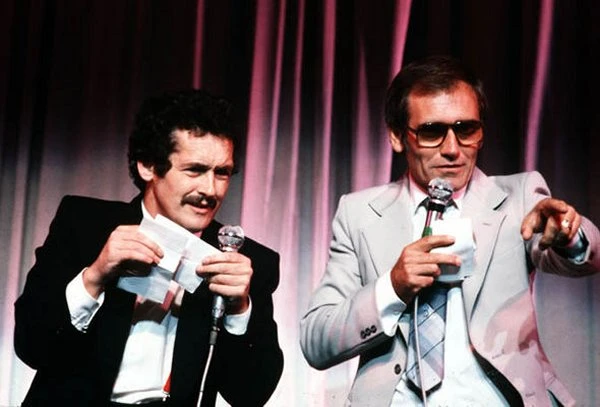
The 80s were a strange decade for comedy performers. The alternative scene that came in largely spelled the death knell for many programmes, variety in particular suffering a terminal decline. The Cannon and Ball Show largely bucked the trend, for essentially theirs was a variety show thriving at a time when other programmes seen as too cosy and comfortable were falling by the wayside. The boys could seemingly do no wrong, even when critics thought otherwise. Their movie excursion, Boys in Blue, was roundly panned in 1982, but the television series careered on regardless. But for two ex-welders used to topping up a meagre wage with club performances, the speed to the top came at a cost. The pair enjoyed their rewards to excess and their relationship suffered.
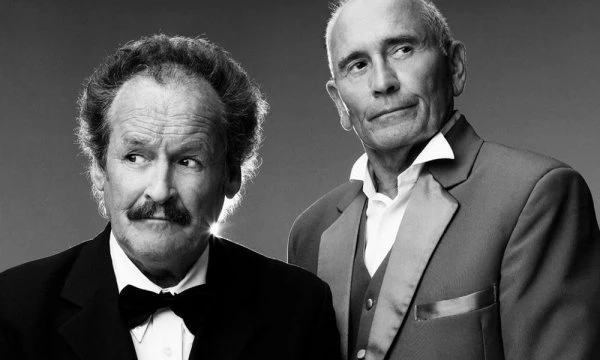
For a significant amount of time the pair performed together without speaking to one another off stage, such was the extent of their falling out. They would reconcile as first Bobby and then Tommy found religion, but their television show could not be saved. After nine series, The Cannon and Ball Show was cancelled and despite some brief attempts to find them a new home and format, they were returned to the hard graft of summer seasons and panto, as much out of necessity after being hit with seven-figure tax demands.

Just when it seemed that the pair’s day was done, Bobby and Tommy came back into the public eye in the most unlikely of places – the Australian jungle, as they flew in to join the 2005 line-up of I’m a Celebrity…Get Me Out of Here! They were a huge success, and although Tommy was voted off first, Bobby captivated audiences, battling through challenges constantly repeating his wife Yvonne’s name to comfort himself. It was the start of a whole new phase of Ball’s career.
He was soon cast in Lee Mack’s Not Going Out, remaining a popular recurring guest star until his death in 2020. He was also a glowing success in The Cockfields, a three part UKTV GOLD series starring Joe Wilkinson.
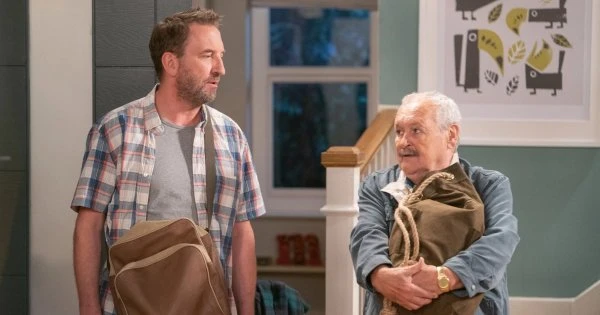
Despite the acting successes for Bobby in a late career surge, it was the partnership with Tommy that was the catalyst for everything he had achieved, so their swansong as a double act on television was perhaps an appropriate one and arguably the highlight of their career. Some 30 years after the end of The Cannon and Ball Show, the pair joined a number of other aging British acts for the ITV programme Last Laugh in Vegas, as Vegas Strip giant Frank Marino attempted to assemble a variety show for British talent in the twilight of their careers. Despite a shaky start and a whole lot of tears (the show was filmed during the tragic mass shooting event on the strip in 2018), the likes of Cannon and Ball, Su Pollard, Bernie Clifton and Kenny Lynch brought the house down, with Cannon and Ball closing the show with one of their most famous routines – Tommy trying to perform a solo song, but constantly interrupted by Bobby on a brass trumpet.
That show was a source of great pride to the pair, Ball claiming that ‘…you can’t get bigger than Vegas, but we’ve done it…and I can sit back and say we’ve done it.’ And indeed they had. While people don’t recall The Cannon and Ball Show in the same way they quote Morecambe and Wise sketches, the current generation of comedy actors and performers have nothing but admiration for Bobby and Tommy’s legacy. Theirs was certainly a more mock-aggressive physical style of comedy, but somehow there was still a warmth that came from them. Bobby was far more involved with the audience than any of the established double acts while Cannon was the finest of straight men, not easy given the antics of Ball.
After their Vegas success, Tommy Cannon proudly admitted, ‘We could not have asked for anything better,’ and for a generation of Saturday night television viewers, neither could the prime time audiences. Rock On…
Written by Brian Slade:
Born and raised in Dorset, Brian Slade turned his back on a twenty-five-year career in IT in order to satisfy his writing passions. After success with magazine articles and smaller biographical pieces, he published his first full-length work, `Simon Cadell: The Authorised Biography'.
Brian is a devoted fan of the comedy stars of yesteryear, citing Eric Morecambe, Ken Dodd, Harpo Marx and Dudley Moore amongst his personal favourites. He was drawn to the story of Simon Cadell through not only `Hi-de-hi!' but also `Life Without George', a programme he identified with having grown up in the Thatcher era.
Published on May 5th, 2021. Written by Brian Slade for Television Heaven.





